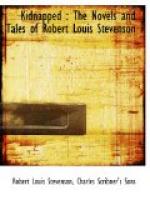Indeed he was more pedantic than I can represent him, and placed more scraps of Latin in his speech; but it was all uttered with a fine geniality of eye and manner which went far to conquer my distrust. Moreover, I could see he now treated me as if I was myself beyond a doubt; so that first point of my identity seemed fully granted.
“Sir,” said I, “if I tell you my story, I must commit a friend’s life to your discretion. Pass me your word it shall be sacred; and for what touches myself, I will ask no better guarantee than just your face.”
He passed me his word very seriously. “But,” said he, “these are rather alarming prolocutions; and if there are in your story any little jostles to the law, I would beg you to bear in mind that I am a lawyer, and pass lightly.”
Thereupon I told him my story from the first, he listening with his spectacles thrust up and his eyes closed, so that I sometimes feared he was asleep. But no such matter! he heard every word (as I found afterward) with such quickness of hearing and precision of memory as often surprised me. Even strange outlandish Gaelic names, heard for that time only, he remembered and would remind me of, years after. Yet when I called Alan Breck in full, we had an odd scene. The name of Alan had of course rung through Scotland, with the news of the Appin murder and the offer of the reward; and it had no sooner escaped me than the lawyer moved in his seat and opened his eyes.
“I would name no unnecessary names, Mr. Balfour,” said he; “above all of Highlanders, many of whom are obnoxious to the law.”
“Well, it might have been better not,” said I, “but since I have let it slip, I may as well continue.”
“Not at all,” said Mr. Rankeillor. “I am somewhat dull of hearing, as you may have remarked; and I am far from sure I caught the name exactly. We will call your friend, if you please, Mr. Thomson—that there may be no reflections. And in future, I would take some such way with any Highlander that you may have to mention—dead or alive.”




